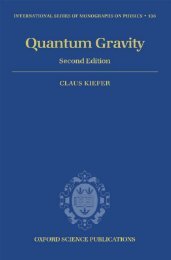- Page 2:
Astroparticle Physics
- Page 6:
Prof. Dr. Claus GrupenUniversity of
- Page 12:
VIPrefaceand M.Sc. Mehmet T. Kurt (
- Page 16:
VIIIPrefaceOn top of that, the basi
- Page 20:
XTable of Contents5 Acceleration Me
- Page 24:
XIITable of Contents11 The Cosmic M
- Page 30:
11 Historical Introduction“Look i
- Page 34:
1.1 Discoveries in the 20th Century
- Page 38:
1.1 Discoveries in the 20th Century
- Page 42:
1.1 Discoveries in the 20th Century
- Page 46:
1.2 Discoveries of New Elementary P
- Page 50:
1.3 Start of the Satellite Era 11ex
- Page 54:
1.3 Start of the Satellite Era 13CO
- Page 58:
1.3 Start of the Satellite Era 1519
- Page 62:
1.4 Open Questions 171989) and at e
- Page 66:
1.5 Problems 191.5 Problems1. Work
- Page 72:
22 2 The Standard Model of Elementa
- Page 84:
}28 2 The Standard Model of Element
- Page 88:
30 2 The Standard Model of Elementa
- Page 92:
32 2 The Standard Model of Elementa
- Page 98:
353 Kinematics and Cross Sections
- Page 102:
3.1 Threshold Energies 373.1 Thresh
- Page 106:
3.2 Four-Vectors 39Example 3: Consi
- Page 110:
3.2 Four-Vectors 41Example 6: Muon
- Page 114:
3.2 Four-Vectors 43Because of E γ2
- Page 118:
3.3 Lorentz Transformation 45energi
- Page 122:
3.5 Problems 47If j is the particle
- Page 126:
494 Physics of Particleand Radiatio
- Page 130:
4.2 Interaction Processes Used for
- Page 134:
4.2 Interaction Processes Used for
- Page 138:
4.3 Principles of the Atmospheric A
- Page 142:
4.4 Special Aspects of Photon Detec
- Page 146:
4.6 Propagation and Interactions of
- Page 150:
4.8 Problems 61board of a satellite
- Page 154:
635 Acceleration Mechanisms“Physi
- Page 158:
5.2 Acceleration by Sunspot Pairs 6
- Page 162:
5.3 Shock Acceleration 67The ejecte
- Page 166:
5.5 Pulsars 69Since this accelerati
- Page 170:
5.6 Binaries 71one obtains, using E
- Page 174:
5.7 Energy Spectra of Primary Parti
- Page 178:
5.7 Energy Spectra of Primary Parti
- Page 182:
776 Primary Cosmic Rays“It will b
- Page 186:
6.1 Charged Component of Primary Co
- Page 190:
6.1 Charged Component of Primary Co
- Page 194:
6.1 Charged Component of Primary Co
- Page 198:
6.1 Charged Component of Primary Co
- Page 202:
6.2 Neutrino Astronomy 87is only co
- Page 206:
6.2 Neutrino Astronomy 89ν e + e
- Page 210:
6.2 Neutrino Astronomy 91For an ass
- Page 214:
6.2 Neutrino Astronomy 93upward-goi
- Page 218:
6.2 Neutrino Astronomy 957 Be + p
- Page 222:
6.2 Neutrino Astronomy 97A reconstr
- Page 226:
6.2 Neutrino Astronomy 99nos (or in
- Page 230:
6.2 Neutrino Astronomy 101In the ho
- Page 234:
6.2 Neutrino Astronomy 103The exper
- Page 238:
6.2 Neutrino Astronomy 105muon spec
- Page 242:
6.2 Neutrino Astronomy 107The setup
- Page 246:
6.3 Gamma Astronomy 109All parts of
- Page 250:
6.3 Gamma Astronomy 111The energy s
- Page 254:
6.3 Gamma Astronomy 1136.3.3 Measur
- Page 258:
6.3 Gamma Astronomy 115v = c n = 29
- Page 262:
6.3 Gamma Astronomy 117The relation
- Page 266:
6.3 Gamma Astronomy 119Future space
- Page 270:
6.3 Gamma Astronomy 121γ -ray burs
- Page 274:
6.4 X-Ray Astronomy 123bursters all
- Page 278:
6.4 X-Ray Astronomy 125synchrotron
- Page 282:
6.4 X-Ray Astronomy 127In 1952 Wolt
- Page 286:
6.4 X-Ray Astronomy 129In 1959 the
- Page 290:
6.4 X-Ray Astronomy 131Measurements
- Page 294:
6.5 Gravitational-Wave Astronomy 13
- Page 298:
6.5 Gravitational-Wave Astronomy 13
- Page 302:
6.6 Problems 1373. Radiation exposu
- Page 306:
6.6 Problems 139the star and its te
- Page 310:
1417 Secondary Cosmic Rays“There
- Page 314:
7.1 Propagation in the Atmosphere 1
- Page 318:
7.1 Propagation in the Atmosphere 1
- Page 322:
7.2 Cosmic Rays at Sea Level 1477.2
- Page 326:
7.2 Cosmic Rays at Sea Level 149muo
- Page 330:
7.3 Cosmic Rays Underground 151N(ν
- Page 334:
7.3 Cosmic Rays Underground 153[ a
- Page 338:
7.3 Cosmic Rays Underground 155Fig.
- Page 342:
7.4 Extensive Air Showers 157hadron
- Page 346:
7.4 Extensive Air Showers 159precis
- Page 350:
7.4 Extensive Air Showers 161primar
- Page 354:
7.5 Nature and Origin of the Highes
- Page 358:
7.5 Nature and Origin of the Highes
- Page 362:
7.5 Nature and Origin of the Highes
- Page 366:
7.6 Problems 169‘Milky Way’ of
- Page 370:
1718 Cosmology“As far as the laws
- Page 374:
8.1 The Hubble Expansion 173isotrop
- Page 378:
8.2 The Isotropic and Homogeneous U
- Page 382:
8.3 The Friedmann Equation from New
- Page 386:
8.4 The Friedmann Equation from Gen
- Page 390:
8.4 The Friedmann Equation from Gen
- Page 394:
8.7 Nature of Solutions to the Frie
- Page 398:
8.7 Nature of Solutions to the Frie
- Page 402:
8.8 Experimental Evidence for the V
- Page 406:
8.9 Problems 189where E max is the
- Page 410:
1919 The Early Universe“Who cares
- Page 414:
9.2 Thermodynamics of the Early Uni
- Page 418:
9.2 Thermodynamics of the Early Uni
- Page 422:
9.2 Thermodynamics of the Early Uni
- Page 426:
9.3 Solving the Friedmann Equation
- Page 430:
9.3 Solving the Friedmann Equation
- Page 434:
9.4 Thermal History of the First Te
- Page 438:
9.5 The Baryon Asymmetry of the Uni
- Page 442:
9.5 The Baryon Asymmetry of the Uni
- Page 446:
9.5 The Baryon Asymmetry of the Uni
- Page 450: 9.6 Problems 211investigation of CP
- Page 454: 21310 Big Bang Nucleosynthesis“In
- Page 458: 10.2 Start of the BBN Era 215these
- Page 462: 10.3 The Neutron-to-Proton Ratio 21
- Page 466: 10.4 Neutrino Decoupling, Positron
- Page 470: 10.5 Synthesis of Light Nuclei 221i
- Page 474: 10.6 Detailed BBN 223Fig. 10.4Evolu
- Page 478: 10.6 Detailed BBN 225prediction for
- Page 482: 10.7 Constraints on the Number of N
- Page 486: 22911 The Cosmic MicrowaveBackgroun
- Page 490: 11.2 Discovery and Basic Properties
- Page 494: 11.3 Formation of the CMB 23311.3 F
- Page 498: 11.4 CMB Anisotropies 235Once the p
- Page 504: 238 11 The Cosmic Microwave Backgro
- Page 508: 240 11 The Cosmic Microwave Backgro
- Page 512: 242 11 The Cosmic Microwave Backgro
- Page 516: 244 11 The Cosmic Microwave Backgro
- Page 520: 246 12 Inflation12.1 The Horizon Pr
- Page 524: 248 12 InflationΩ at the Planck ti
- Page 528: 250 12 Inflationcausally isolated r
- Page 532: 252 12 InflationOne can now ask wha
- Page 536: 254 12 Inflationexcitation of this
- Page 540: 256 12 InflationFig. 12.3Schematic
- Page 544: 258 12 Inflationinflationary period
- Page 548: 260 12 Inflationdilutionof magnetic
- Page 552:
262 12 InflationFig. 12.4Measuremen
- Page 556:
264 12 InflationΩ gravity waves =
- Page 560:
266 13 Dark Matterearly universedev
- Page 564:
268 13 Dark Mattermass density54321
- Page 568:
270 13 Dark Matterbrown dwarvesFig.
- Page 572:
272 13 Dark MatterNACHOsultracold g
- Page 576:
274 13 Dark Matterneutrinosas free
- Page 580:
276 13 Dark Mattersupersymmetric ex
- Page 584:
278 13 Dark MatterIt is not totally
- Page 588:
280 13 Dark Mattertrue vacuumcosmol
- Page 592:
282 13 Dark Matterpropertiesof non-
- Page 596:
284 13 Dark MatterquintessenceBoome
- Page 600:
286 13 Dark Matter3. Derive the Fer
- Page 604:
288 14 Astrobiologyage of life on E
- Page 608:
290 14 Astrobiologybeen the result
- Page 614:
29315 Outlook“My goal is simple.
- Page 618:
15 Outlook 295also the cosmological
- Page 622:
15.1 Problems 29715.1 Problems1. It
- Page 628:
300 16 GlossaryMeasurement of exten
- Page 632:
302 16 GlossaryAn asymmetry created
- Page 636:
304 16 GlossarySensitive resistance
- Page 640:
306 16 GlossaryA Friedmann-Lemaîtr
- Page 644:
308 16 GlossaryThe cosmological con
- Page 648:
310 16 GlossaryThe apparent change
- Page 652:
312 16 GlossaryFermi-Dirac distribu
- Page 656:
314 16 GlossaryExtragalactic gamma-
- Page 660:
316 16 GlossaryHawking radiationHaw
- Page 664:
318 16 GlossaryNuclei of fixed char
- Page 668:
320 16 GlossaryTotal light emission
- Page 672:
322 16 GlossaryMpcMSW effectMtheory
- Page 676:
324 16 GlossaryOA Friedmann-Lemaît
- Page 680:
326 16 GlossaryRotating neutron sta
- Page 684:
328 16 GlossaryThe number of neutra
- Page 688:
330 16 GlossaryOr cascade. High-ene
- Page 692:
332 16 GlossaryPhenomenon of appare
- Page 696:
334 16 Glossarytime-reversal invari
- Page 700:
336 16 GlossaryXX bosonXMM-NewtonX-
- Page 704:
338 17 Solutionsv 2 = r 2 ω 2 = G
- Page 708:
340 17 SolutionsWithµ = 1.67 × 10
- Page 712:
342 17 Solutionsor2m e (E e + + m e
- Page 716:
344 17 Solutions2. The relative ene
- Page 720:
346 17 Solutions17.5 Chapter 51. a)
- Page 724:
348 17 Solutions17.6 Chapter 6Sect.
- Page 728:
350 17 Solutionsc) With the numbers
- Page 732:
352 17 SolutionsSolid angle: Ω =A4
- Page 736:
354 17 SolutionsThe solution of thi
- Page 740:
356 17 SolutionsSect. 6.51. E = GMm
- Page 744:
358 17 SolutionsN 1 (> 2GeV) = a∫
- Page 748:
360 17 Solutions2E kin = 3kT M µ =
- Page 752:
362 17 Solutions7. An observer in e
- Page 756:
364 17 SolutionsWith the ansatzR =
- Page 760:
366 17 Solutions(Solve for v ∗ :
- Page 764:
368 17 Solutions17.11 Chapter 111.
- Page 768:
370 17 Solutionsb) At last scatteri
- Page 772:
372 17 Solutions4.( ) 2R 0 t0 3= ,R
- Page 776:
374 17 SolutionsThe axion mass does
- Page 780:
376 17 Solutions100 kg kgW 0 = = 50
- Page 784:
378 17 SolutionsThis results inM pl
- Page 790:
381A Mathematical AppendixA.1 Selec
- Page 794:
A.1 Selected Formulae 383∫e x dx
- Page 798:
A.2 Mathematics for Angular Variati
- Page 802:
A.2 Mathematics for Angular Variati
- Page 806:
389B Results from Statistical Physi
- Page 810:
B.1 Statistical Mechanics Review 39
- Page 814:
B.1 Statistical Mechanics Review 39
- Page 818:
B.1 Statistical Mechanics Review 39
- Page 822:
B.2 Number and Energy Densities 397
- Page 826:
B.3 Equations of State 399which rel
- Page 830:
401C Definition of Equatorialand Ga
- Page 834:
403D Important Constants for Astrop
- Page 838:
405References“References are like
- Page 842:
407Further Reading“Education is t
- Page 846:
Further Reading 409Ulf Borgeest, Ka
- Page 850:
Further Reading 411M. A. Bucher, D.
- Page 856:
414 Photo Credits{20} ESA/XMM-Newto
- Page 860:
416 Indexanisotropy, 85, 86- cosmic
- Page 864:
418 Index- of hydrogen, 94, 222, 22
- Page 868:
420 Index- parameters, 243- - deter
- Page 872:
422 Indexeffective number of degree
- Page 876:
424 IndexFeynman diagram, 26, 98, 2
- Page 880:
426 IndexHarrison-Zel’dovich spec
- Page 884:
428 IndexKoshiba, M., 13kpc, 318, s
- Page 888:
430 Index- standard, see StandardMo
- Page 892:
432 Index- primary, energy spectrum
- Page 896:
434 Indexplanet, extrasolar, 18plan
- Page 900:
436 Indexrange- relation, energy-,
- Page 904:
438 Index- dark, 269- double, see b
- Page 908:
440 Indexuncertainty- principle, se



![arXiv:1001.0993v1 [hep-ph] 6 Jan 2010](https://img.yumpu.com/51282177/1/190x245/arxiv10010993v1-hep-ph-6-jan-2010.jpg?quality=85)

![arXiv:1008.3907v2 [astro-ph.CO] 1 Nov 2011](https://img.yumpu.com/48909562/1/190x245/arxiv10083907v2-astro-phco-1-nov-2011.jpg?quality=85)

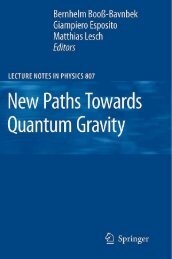
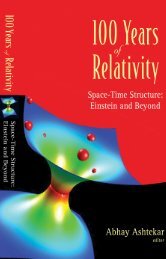

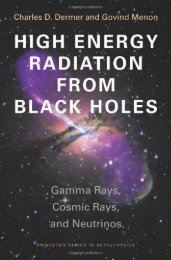
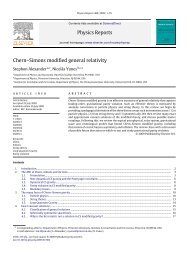
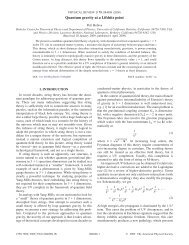

![arXiv:1002.4928v1 [gr-qc] 26 Feb 2010](https://img.yumpu.com/41209516/1/190x245/arxiv10024928v1-gr-qc-26-feb-2010.jpg?quality=85)
![arXiv:1206.2653v1 [astro-ph.CO] 12 Jun 2012](https://img.yumpu.com/39510078/1/190x245/arxiv12062653v1-astro-phco-12-jun-2012.jpg?quality=85)
